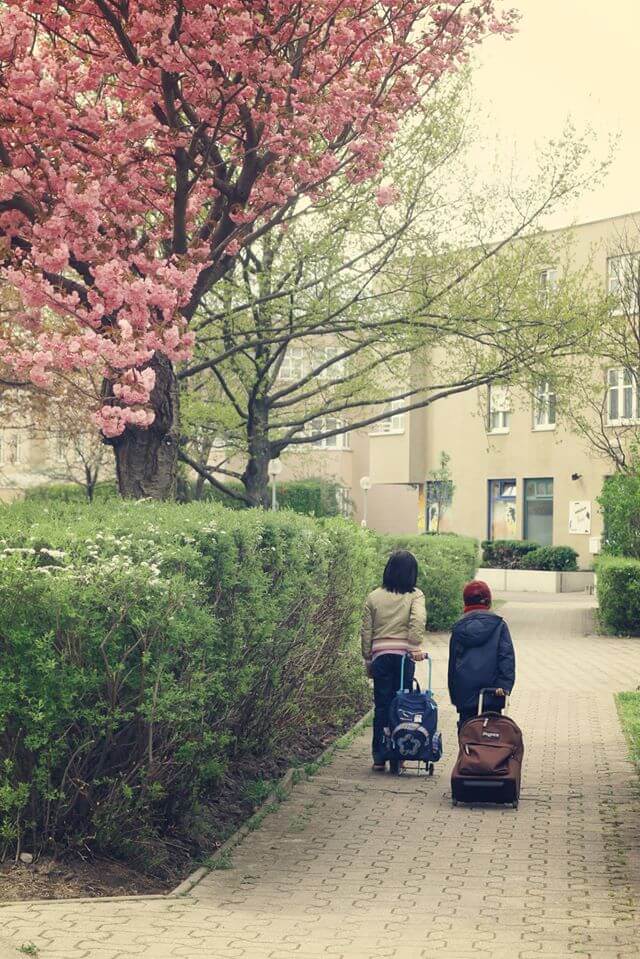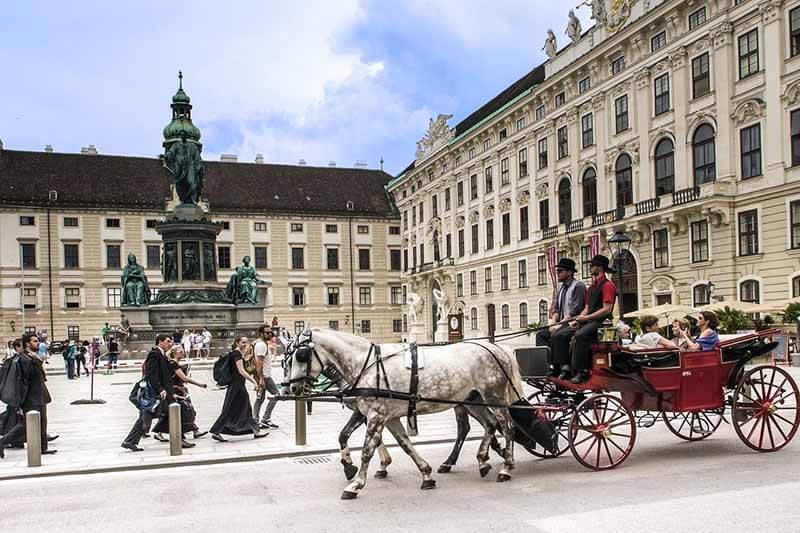
The Filipino-Austrian Friendship Week 2024 is organized by the Philippine Department of Migrant Workers, ADVANTAGE AUSTRIA Philippines and the Austrian Embassy in the Philippines with the theme “Engaging the Stakeholders with a Sense of Commitment and Genuine Partnership”. This comprehensive initiative combines diplomatic, cultural and economic elements to strengthen bilateral relations between the two countries. Above all, the event aims to promote Austria as a destination country for Filipino skilled workers in the form of cultural performances, information highway and a jobfair.
In Vienna, the event is supported by the Bundesministerium für Arbeit und Wirtschaft (Federal Ministry for Labor and Economy), Wirtschaftskammer Wien (Vienna Chamber of Commerce), and The Austrian Business Agency (an Immigration and Residence Services) along with the Philippine Embassy.

#ServusKaibigan
To kick off the activities, the organizers rounded up the participants for a competition that run a month prior. The contest called on Filipinos to share their most beautiful stories associated with living and working in Austria using the hashtag #ServusKaibigan. “Servus” has evolved to become a common informal greeting in certain German-speaking regions, particularly in Austria and parts of Bavaria in Germany. In this context, “Servus” is used as a friendly and informal way to say “hello,” “hi,” or “goodbye.” It’s equivalent to the English greeting “hi” or “hey.” It reflects a sense of familiarity and warmth, often used among friends, acquaintances, or in casual settings.
Kaibigan is the Tagalog word in Filipino that translates to “friend” or “companion” in English. It’s a term used to refer to someone who shares a close and supportive relationship with another person. In Filipino culture, friendship, or “kaibigan,” holds significant value, and the term is commonly used to address or describe someone with whom one shares mutual trust, camaraderie, and affection.

Members of the Filipino community in Austria were encouraged to share their thoughts on Austria by submitting a video or a photo. The goal is to promote Austria’s distinctiveness and to raise awareness among family, friends, and the Filipino community, encouraging them to visit Austria as well.
Participants were to upload their entries on Facebook or Instagram to qualify. Participation is generally open to anyone with a public profile who posts on either of these platforms using the hashtag. The post should explain why Austria is the ideal place for Filipino workers to live and work at.
Among 57 entries, Jajha Abanilla de Chavez and Keytlin Kamil emerged as the winners for the photo and video categories, respectively.
Good Relationship
The event was nothing short of positive remarks from the heads of the departments that organized it, highlighting the work ethics Filipinos are known for, be it in the healthcare industry or anywhere else.
Labor and Economics Minister Martin Kocher said: “Due to the high demand for work and skilled workers, in addition to the many measures at home, efforts are also needed to bring qualified skilled workers from third countries to Austria. The Philippines is an important country in the field of international skilled workers due to its well-educated and mobile population. The Philippines is the first country with which Austria signed a Memorandum of Understanding (MoU) for cooperation on key workers and skilled workers in autumn 2023.”

Eva Landrichtinger, Secretary General of the BMAW gave good news: “The Philippines offers great potential for qualified workers and skilled workers who are urgently needed in Austria. Since the conclusion of the MoU, cooperation with the Philippines has been intensified and significant progress has already been made. With the Austrian-Filipino Friendship Week, we would like to increase the interest of qualified workers and skilled workers from the Philippines in the Austrian labor market.”
Karlheinz Kopf, Secretary General of the WKÖ, is pleased that the Memorandum of Understanding between Austria and the Philippines signed in the fall is being followed by another concrete cooperation project with the Friendship Week: “Here, as part of several events in Manila, we have the opportunity to once again draw attention to the attractiveness of Austria as a location. The well-trained skilled workers from the Philippines are now most welcome in all sectors, whether technology, crafts, IT, healthcare or tourism, as there is still a shortage of personnel in these areas.”

ABA managing director René Tritscher sees the social media challenge with 59 submissions as an important initial impulse to make Austria known as a place to work in the Philippines. Under #ServusKaibigan, members of the Filipino community in Austria shared special features of Austria in their personal environment and beyond via videos or photos. “With initiatives like our challenge, we are building a bridge between people with Filipino roots living here and the people in the Philippines. We want to draw attention to the existing Filipino community and thus make Austria attractive as a place to work and live for professionals from IT, technology and other professional groups with a high need for skilled workers. If interest in Austria is aroused, at WORK in AUSTRIA supports international professionals with one-stop services, from support in finding a job to assistance with the immigration process to information on living and working in Austria.”

Philippine Ambassador to Austria Evangelina Lourdes Bernas says: “Guided by our government’s whole-of-society approach, the Embassy continues to work closely with the Department of Migrant Workers (DMW), the Austrian government, civil society partners, and our diaspora in the “advancement of an ethical, sustainable, and transparent recruitment framework for our overseas Filipino workers.”
Filipino overseas employmentin Austria started as far back as the 1970s. To address the severe Austrian nursing shortage then, the Philippine Department of Labor and the City of Vienna negotiated a bilateral agreement in 1973 that facilitated the recruitment of Filipino nurses for Austrian hospitals. With this accomplishment, the first wave of Filipino immigrants to Austria began. Up to 720 Filipino nurses travelled to Austria to work. On July 17, 1974, the first 20 Filipino nurses arrived in Vienna.
The Austrian government signed three-year extendable working contracts with them, paid for all of their entry costs, sponsored German language classes, and equated nursing credentials from the Philippines and Austria. A number of them took the chance to bring their families to Austria…thus, the Filipino community in Austria begun to grow.
Program
As guests were warmly welcomed by the organizers, we had the pleasure of meeting the heads of the departments responsible for orchestrating the event and the Austrian-Philippine Friendship Week in its entirety. Following this introduction, winners and participants of the #ServusKaibigan challenge were invited forward for photo opportunities and to receive their well-deserved certificates.
In the elegant marble room, Erin Silangil, a California-born soprano based in Vienna, graced the evening with her melodious voice. Known for promoting Filipino Kundiman, Erin gave a beautiful rendition of Babalik Sa ‘yo (by Moira de la Torre) and Ang Maya (a Kundiman written by Jose Estella).
No Filipino gathering would be complete without a feast, and true to tradition, we were treated to a delightful fusion of Austrian and Filipino culinary delights. Lumpiang shanghai, not only a favorite of Filipinos, was the first dish to disappear from the table within minutes, a testament to its irresistible appeal/yumminess!







What a great initiative!
Sounds like a good event. So many positive things to hear about.
Sounds like a great event. Great to see friendship week being celebrated.
Happy Friendship week! I love Filipino food so the Lumpiang shanghai sounds delicious.
Didn’t know about the Austrian-Philippine Friendship Week 2024 until reading your blog story about it. It’s a nice initiative definitely, good read & thanks for sharing this. Cheers SiennyLovesDrawing
It’s a good example for any agency to have this activity. And manpower lent to another country is beneficial for many sides.
It’s such a great initiative from both governments, and benefits each other too!
Thank you for sharing this event. It sounds like a very positive collaboration for the progress of the members who follow it.
How interesting! I’m glad that there was a week set aside to acknowledge the flourishing relationship between Austria and the Philippines!
sounds like a beautiful event and initiative, and so wonderful to be a part of such celebrations
I love the purpose and initiative of this event. Having good relationships with other countries is a good thing that will give other Filipinos to work in a beautiful and safe country.